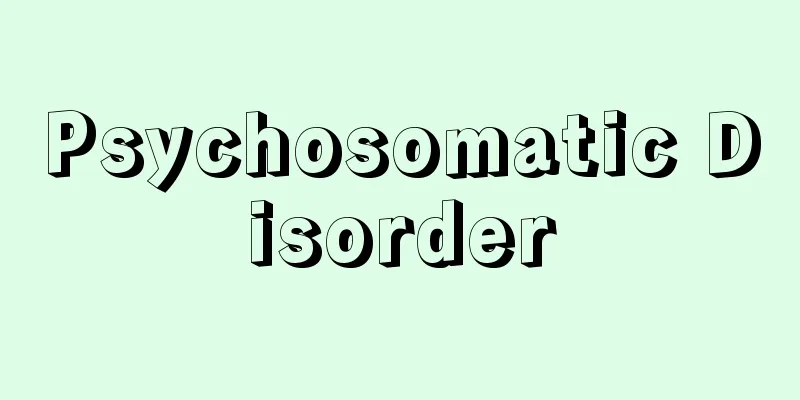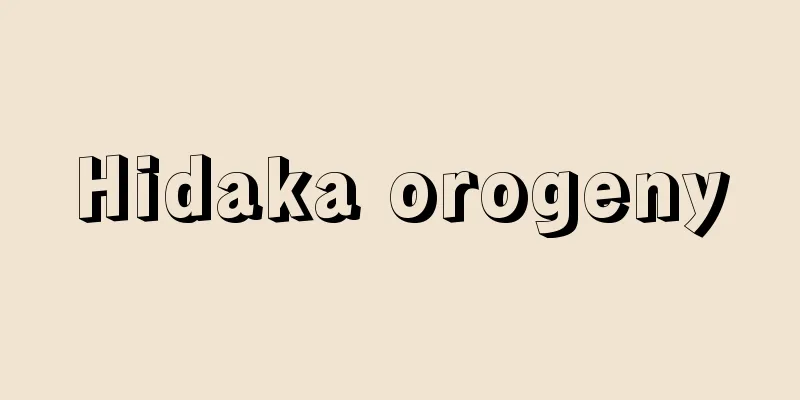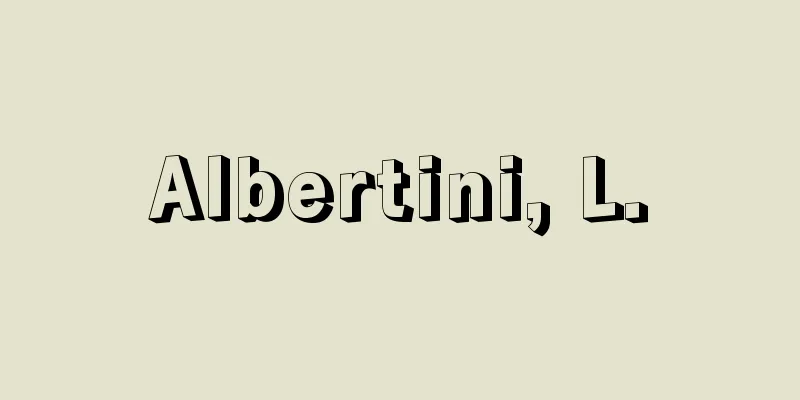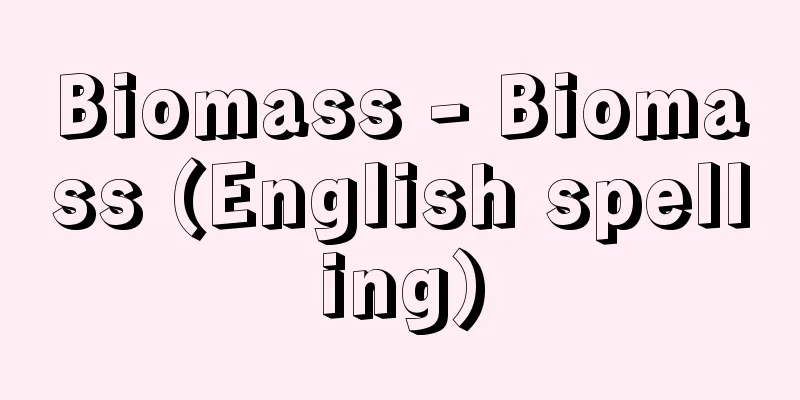Psychosomatic Disorder

|
[What kind of disease is it?] Diseases in which physical symptoms appear in specific organs due to psychological causes are called psychosomatic diseases. These diseases are categorized according to the organs in which they originate. ●Respiratory system: bronchial asthma, hyperventilation syndrome (psychogenic dyspnea), etc. ●Digestive system: Recurrent abdominal pain, cyclical vomiting, irritable bowel syndrome (constipation, diarrhea, etc.), peptic ulcers, anorexia nervosa, bulimia (eating disorders), etc. ●Cardiovascular system: Cardiac neurosis (tachycardia attacks), hypertension, angina pectoris, etc. Urinary system Nervous frequency of urination, bedwetting, etc. ●Sensory/motor system: Sensory/motor paralysis, writer's cramp, spasmodic torticollis, tics ('childhood tics'), etc. Writer's cramp is when mental stress causes the hands and fingers to temporarily stiffen, making it impossible to write. Spasmodic torticollis is when mental stress causes one side of the neck to remain stiff, causing the neck to tilt to the opposite side, and in some cases, the affected side of the neck may show obvious hypertrophy. ●Endocrine system Hyperthyroidism, diabetes, etc. ●Skin: Atopic dermatitis, hives, alopecia areata, etc. ●Other symptoms include headaches (especially tension headaches), dizziness, sleep disorders (insomnia), etc. Although many of these illnesses are generally treated as physical illnesses, a detailed look at the patient's medical history may reveal that behavioral patterns in daily life or mental disorders may have had a profound impact on the onset and worsening of the illness. These various diseases can be roughly divided into two groups: those that are strongly associated with mental illness, and those that are strongly associated with physical illness. In other words, "functional" disorders that do not involve tissue lesions, such as hyperventilation syndrome and cardiac neurosis, are closer to mental illness, while "organic" disorders that involve tissue lesions, such as peptic ulcers and angina pectoris, are closer to physical illness. In the narrow sense, psychosomatic disorders tend to refer to disorders that are similar to physical disorders. In particular, disorders that are similar to mental disorders have a neurotic vicious cycle in which anxiety causes physical symptoms, which in turn increase anxiety. In any case, however, psychosomatic disorders can be said to be in a kind of gray zone that cannot be classified as either mental or physical disorders. [Cause] Psychosomatic illnesses can be understood as the physical expression of repressed mental conflicts and distortions, but a common feature of psychosomatic illnesses is that while the physical symptoms are what catches our attention, the underlying psychological factors are not easily visible. In other words, people with psychosomatic disorders have difficulty recognizing or verbalizing their own mental conflicts, stress, or physical discomfort, and are said to be in a state of over-adaptation to social life. This psychological characteristic is called alexithymia (alexithymia or apathy). A common example is a person who is confident in their physical strength and full of vitality, without a single complaint, even in a stressful situation that would cause a normal person to cry, but who suddenly collapses from angina pectoris or a peptic ulcer. This behavioral pattern of moving single-mindedly toward one's goal without regard for one's own body is also known as Type A behavior, and unconsciously accumulated stress leads to imbalance of the autonomic nervous system and endocrine system. In other words, in the case of peptic ulcers, the mechanism by which excessive secretion of gastric acid and adrenal cortex hormones causes damage to the mucous membranes of the stomach and duodenum is thought to be involved. [Treatment] Since patients often believe that their illness is purely physical, treatment focuses on treating the physical aspects first. Then, gradually, we encourage the patient to pay attention to their inner self. As a result, the patient becomes aware of their own behavioral patterns and even more fundamental psychological conflicts and abnormalities in their personality structure, which can serve as an opportunity to correct them. This is a method based on general psychotherapy for mental illnesses such as neurosis and depression, but some believe that for psychosomatic illnesses based on the psychological characteristic of alexithymia, a non-verbal, experiential approach is more effective than this verbal, internal approach. These include autogenic training, which teaches self-control of physical tension, behavioral therapies such as systematic desensitization, which eliminates abnormal physical reactions by actually confronting stressful situations, and Morita therapy, which helps to break attachment to symptoms by practicing acting while still having the symptoms.For tension headaches, spasmodic torticollis, writer's cramp, etc., there is also a method called biofeedback, which uses electromyography to teach self-control of muscle tension. In parallel with these treatments, psychotropic drugs such as anti-anxiety drugs and antidepressants are also used to relieve tension and lift mood, but caution is required as they may cause side effects such as drowsiness, dry mouth, and constipation. Source: Shogakukan Home Medical Library Information |
|
[どんな病気か] 心理的な原因によって、特定の器官に限定されて身体症状が現われる疾患を、心身症と呼んでいます。これらの疾患を発生器官別に分けてみます。 ●呼吸器系 気管支(きかんし)ぜんそく、過換気症候群(かかんきしょうこうぐん)(心因性呼吸困難(しんいんせいこきゅうこんなん))など。 ●消化器系 反復性腹痛(はんぷくせいふくつう)、周期性嘔吐(しゅうきせいおうと)、過敏性腸症候群(かびんせいちょうしょうこうぐん)(便秘(べんぴ)、下痢(げり)など)、消化性潰瘍(しょうかせいかいよう)、神経性食欲不振症(しんけいせいしょくよくふしんしょう)、過食症(かしょくしょう)(摂食障害(「摂食障害」))など。 ●循環器系 心臓神経症(しんぞうしんけいしょう)(頻脈発作(ひんみゃくほっさ))、高血圧症(こうけつあつしょう)、狭心症(きょうしんしょう)など。 ●泌尿器系(ひにょうきけい) 神経性頻尿(しんけいせいひんにょう)、夜尿症(やにょうしょう)など。 ●知覚・運動系 知覚・運動まひ、書痙(しょけい)、痙性斜頸(けいせいしゃけい)、チック(「子どものチック」)など。 書痙とは、精神緊張によって手や指が一時的に硬直して、字が書けなくなることです。痙性斜頸は、精神緊張によって片方の頸部筋が硬直し続け、くびが反対側に傾斜することで、病変のある側の頸部筋に明らかな肥大がみられる場合もあります。 ●内分泌系(ないぶんぴつけい) 甲状腺機能亢進症(こうじょうせんきのうこうしんしょう)、糖尿病(とうにょうびょう)など。 ●皮膚 アトピー性皮膚炎(せいひふえん)、じんま疹(しん)、円形脱毛症(えんけいだつもうしょう)など。 ●その他 頭痛(とりわけ緊張型頭痛(きんちょうがたずつう))、めまい、睡眠障害(不眠症)など。 一般には身体疾患として扱われる病名が多くみられますが、患者さんの病歴を詳細にみると、日常生活における行動パターンや精神面の歪(ゆが)みが病気の発生と悪化に深く影響していると考えられるケースがあります。 こうしたさまざまな疾患は、精神疾患としての色彩が濃厚なもの、身体疾患としての色彩が濃厚なものという2群に大別できます。つまり、過換気症候群や心臓神経症など、組織病変をともなわない「機能性」の障害は精神疾患に近いものに、消化性潰瘍や狭心症など、組織病変をともなう「器質性」の障害は身体疾患に近いものに相当します。 狭い意味での心身症といえば、身体疾患に近いものをさす傾向があります。とくに、精神疾患に近いものでは、不安が身体症状をひきおこし、その身体症状がさらに不安を増すという神経症的な悪循環の構造がみられます。しかし、いずれにしても心身症とは、精神疾患にも身体疾患にも分類できない、一種のグレイゾーンに位置するといえます。 [原因] 心身症は、精神面の葛藤(かっとう)や歪みが抑圧され、身体的に表現されたものとして理解できますが、身体症状ばかりが目につき、その根底にある心理的なものが容易にはみえてこないということが、心身症一般に共通の特色です。 すなわち、心身症の人は、自己の精神的葛藤やストレス、あるいは身体的不調を自覚したり言語化したりするのが不得意であり、社会生活に対して過剰な適応状態にあるといわれています。 このような心理的特性をアレキシチミア(失感情症(しつかんじょうしょう)ないし失体感症(しつたいかんしょう))といいます。通常の人なら音(ね)をあげるようなストレス状況にあっても、不平ひとつもらすことなく、人一倍体力に自信があり、バイタリティーにあふれているといったタイプの人が、突然、狭心症や消化性潰瘍に倒れるというような場合が卑近(ひきん)な例です。 このように、自分自身のからだを顧みず、目的に向かって一直線に邁進(まいしん)する行動パターンはA型行動とも呼ばれ、自覚されないまま蓄積したストレスが自律神経系や内分泌系の失調を招きます。すなわち、消化性潰瘍に関していえば、胃酸(いさん)や副腎皮質(ふくじんひしつ)ホルモンが過剰に分泌され、これらが胃や十二指腸の粘膜(ねんまく)に障害をおこすというメカニズムが考えられます。 [治療] 患者さんは自分の病気を純粋な身体疾患であると思いこんでいる場合が多いので、治療としては、まず身体面の治療を重視します。そして徐々に患者さん自身の内面に注意を促していきます。その結果、患者さんは自己の行動パターンや、さらに根本的な心理的葛藤や性格構造の異常を自覚し、それを正す契機とすることができるわけです。 これは、神経症やうつ病などの精神疾患に対する一般的な精神療法に準じたやり方ですが、アレキシチミアという心理特性を基盤にもつ心身症に対しては、このような言語的・内面的アプローチよりも非言語的・体験的アプローチのほうが有効であるとする考え方もあります。 これには、身体的緊張の自己コントロールを学習する自律訓練法、ストレス状況に実際に直面することを通して異常な身体反応を除去する系統的脱感作法(だつかんさほう)などの行動療法、あるいは症状をもったまま行動することの実践によって症状への執着を断つ森田療法などがありますが、緊張型頭痛、痙性斜頸、書痙などに対しては筋電図を用いながら筋緊張の自己コントロールを学習するバイオフィードバックという方法もあります。 また、これらの治療と並行して、緊張をやわらげ、気分をひきたてる目的で、抗不安薬や抗うつ薬などの向精神薬が用いられますが、眠け、口の渇き、便秘などの副作用が出る場合があるので注意が必要です。 出典 小学館家庭医学館について 情報 |
Recommend
Kashima Port - Kashimako
An excavated harbor in the southeast of Ibaraki Pr...
Geomagnetism - Chijiki (English spelling) geomagnetism
This refers to the magnetism and magnetic field (...
Kai (rice scoop) - Kai
…This explanation is quoted directly from the Hei...
Factor analysis
Factor analysis is an analytical method that expla...
"Living Soldier" - Living Soldier
...After Kuroshima Denji's "Swirling Cro...
Izanagi Shrine
Located in Taga, Awaji City, Hyogo Prefecture. Th...
Felis silvestris (English spelling) Felis silvestris
…[Tadaaki Imaizumi]. … From [Libyan Cat] …[Tadaak...
Free Soil Party - Free Soil Party
In 1848, the Liberty Party merged with anti-slaver...
Sand fly (stinging butterfly fly)
A general term for insects belonging to the Dipter...
fellow
...However, it was also used to refer to schools ...
Anulomakon - Anulomakon
...The name of the four major classes in Indian s...
Stone cutting - Ishizashi
…But the shepherd Titormos is said to have walked...
Kaisei [town] - Kaisei
A town located in the back of the Sakawa River all...
Garrison - Eiju
In Japan before World War II, a garrison was a mi...
Zhang Xichuan (English spelling)
1860‐1933 A Chinese clinical physician. His courte...









